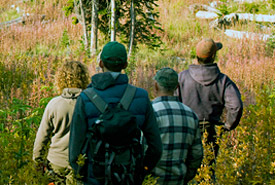Land use

Hikers at Darkwoods, BC (Photo by NCC)
The Nature Conservancy of Canada (NCC) manages its lands to maintain or enhance the ecosystems, ecological communities and/or species targeted for conservation through scientific review and conservation planning. In addition to their ecological value, lands are conserved for the benefit of current and future Canadians.
NCC works where the need is greatest, in the southern regions of Canada. This is where 85 per cent of our species at risk live and compete for living space with 90 per cent of the Canadian population. Of those lands secured by NCC, most remain accessible to the public for pedestrian access (i.e. hiking and cross-country skiing), including for hunting by permission, as governed by provincial and municipal regulations. Some of these lands may not be appropriate for pedestrian access due to particular objectives or sensitivities. Please contact the appropriate office listed below to learn more.
Conservation engagement
In addition to this access, NCC also operates conservation engagement programs that welcome individuals to come explore our properties. These include our Conservation Volunteers and conservation interns programs.
Restrictions on public access
In some cases, however, a property may be too ecologically vulnerable to allow public access. NCC properties will be clearly signed when pedestrian access for the purposes of traditional recreational uses is not allowed. Such restriction may be in place for one or more of the following reasons:
- The ecological values of the property identified as critical for conservation could be negatively impacted by recreational activities. In such cases, access for a variety of human-use purposes beyond hunting may also be limited.
- There is a public safety or community concern or a government authority prohibits certain recreational activities.
- Access is against the wishes of the donor who solely enabled the securement of the property or donated the land.
- For lands conserved through conservation agreement, access has been denied by the private landowner.
For more information
NCC requests that individuals contact the appropriate office prior to accessing NCC lands for traditional recreational uses.




